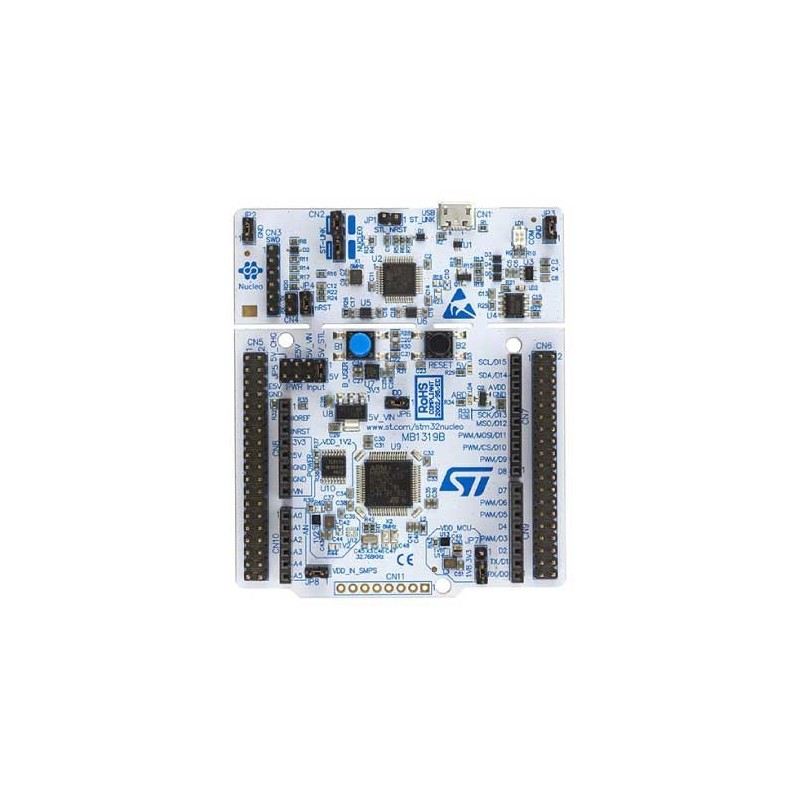




zł59.79 tax excl.
The STM32 Nucleo-64 boards provide an affordable and flexible way for users to try out new concepts and build prototypes with the STM32 microcontrollers, choosing from various combinations of performance, power consumption and features
Description
The STM32 Nucleo-64 boards provide an affordable and flexible way for users to try out new concepts and build prototypes with the STM32 microcontrollers, choosing from various combinations of performance, power consumption and features. For the compatible boards, the SMPS significantly reduces power consumption in Run mode.
The Arduino™ Uno V3 connectivity support and the ST morpho headers allow the easy expansion of the functionality of the STM32 Nucleo open development platform with a wide choice of specialized shields.
The STM32 Nucleo-64 board does not require any separate probe as it integrates the ST-LINK/V2-1 debugger and programmer.
The STM32 Nucleo-64 board comes with the STM32 comprehensive software HAL library together with various packaged software examples, as well as direct access to the Arm® Mbed™ online resources at http://mbed.org.
Features
Data sheet
Manufacturer BTC Korporacja sp. z o. o. Lwowska 5 05-120 Legionowo Poland sprzedaz@kamami.pl 22 767 36 20
Responsible person BTC Korporacja sp. z o. o. Lwowska 5 05-120 Legionowo Poland sprzedaz@kamami.pl 22 767 36 20
STM32 Nucleo development board for STM32 F0 series - with STM32F030R8T6 MCU, 64KB flash memory, STM, RoHS
STM32 Nucleo development board for STM32 L1 series - with STM32L152RE MCU, 512KB flash memory, STM, RoHS
STM32 Nucleo development board for STM32 L0 series - with STM32L053R8 MCU, 64KB flash memory, STM, RoHS
STM32 Nucleo development board for STM32 F3 series - with STM32F302R8 MCU, 64KB flash memory, STM, RoHS
STM32 Nucleo development board for STM32 F3 series - with STM32F334R8T6 MCU, 64KB flash memory, STM, RoHS
No product available!
STM32 Nucleo development board for STM32 F4 series - with STM32F411RE MCU, 512KB flash memory, STM, RoHS
STM32 Nucleo development board for STM32 F0 series - with STM32F072RBT6 MCU, 128KB flash memory, STM, RoHS
STM32 Nucleo development board for STM32 F0 series - with STM32F091RCT6 MCU, 256KB flash memory, STM, RoHS
STM32 Nucleo-64 development board with STM32F303RET6 MCU, supports Arduino and ST morpho connectivity
Starter kit from the NUCLEO series equipped with the STM32F070RBT6 microcontroller (128 KB Flash, Cortex-M0), with a built-in programmer-debugger ST-Link/V2, equipped with connectors compatible with Arduino.
STM32 Nucleo-64 development board with STM32L476RGT6 MCU, supports Arduino and ST morpho connectivity
STM32 Nucleo-64 development board with STM32F446RET6 MCU, supports Arduino and ST morpho connectivity
STM32 Nucleo-64 development board with STM32F410RBT6 MCU, supports Arduino and ST morpho connectivity
STM32 Nucleo-64 development board with STM32L073RZT6 MCU, supports Arduino and ST morpho connectivity
The STM32 Nucleo-64 boards provide an affordable and flexible way for users to try out new concepts and build prototypes with the STM32 microcontrollers, choosing from various combinations of performance, power consumption and features
The P-NUCLEO-AZURE1 STM32 Nucleo pack is a hardware kit composed of the following boards: NUCLEO-L476RG, X-NUCLEO-IDW01M1, X- NUCLEO-IKS01A2 and X-NUCLEO-NFC01A1
No product available!

The STM32 Nucleo-64 boards provide an affordable and flexible way for users to try out new concepts and build prototypes with the STM32 microcontrollers, choosing from various combinations of performance, power consumption and features
